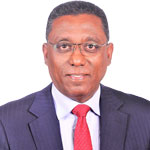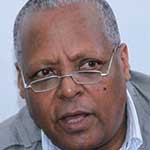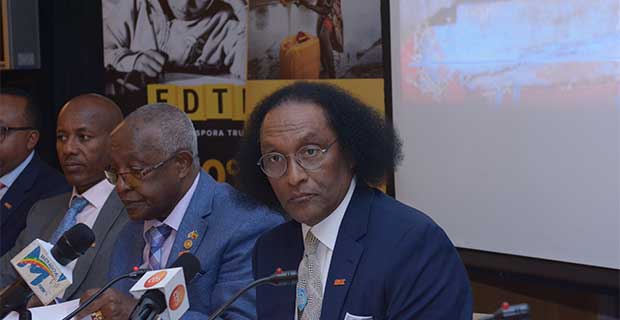
Aug 22 , 2020
By Desta Mebratu (Prof.)
I marveled with a friend a decade back on how far Ethiopia’s diaspora go to keep the bond with their country.
“You may take Ethiopians out of their country, but you cannot take the country out of them,” we concluded.
This is obviously very much related to the incredibly diverse and rich cultural and historical heritage of the people of the country. Due to this strong bond, most Ethiopians in the diaspora have been active participants and contributors to contemporary politics from wherever they are living. As a result, any discussion of Ethiopia’s politics would not be complete without looking at both the strengths and weaknesses of this community's contributions.
The student movement of the 1960s is recognised as the coming of age of Ethiopia’s modern politics. This was eventually reinforced by the strikes and demonstrations of teachers, taxi drivers, religious minorities and the army resulting in the popular movement of 1974. The contributions made by Ethiopian students in the diaspora to the political events leading to the ousting of Emperor Haile Selassie and the subsequent political developments were critical to the country’s recent political history.
Even if the diaspora student movement was initially driven by a passionate commitment to freedom and development of the country, it was plagued from the outset by different positions on what strategy to follow. Although there was sufficient consensus in terms of ideology and objectives to reconcile these differences, attempts made to create a common front failed largely due to the intransigence of the leadership.
The split within the diaspora student groups was automatically mirrored at home when these groups came back to Ethiopia following the change of government in September 1974. The split within the popular movement was further aggravated with some of the measures taken by the Derguethat led to an unforgettable and unfortunate loss of precious lives. While the first generation of diaspora made a critical contribution to the 1974 popular movement, it also had a significant role in squandering the first transitional opportunity of the country, mainly due to the zero-sum political game being played by the main political groups.
The draconian measures taken by the Derguein the second half of the 1970s to squash its opposition led to numerous forms of political suppression besides the significant loss of the educated elites of the country. This, coupled with growing economic hardship, led to the exodus of many young Ethiopians that continued until the fall of the Derguein 1991.
This drastically changed the profile of the diaspora from the first generation. Even if most of the diaspora of the second generation are primarily focused on winning their daily bread and improving their lives, a significant number of them have continued to engage in Ethiopia’s politics. This included involvement in both old and new political parties and support for groups with the different liberation fronts.
Unfortunately, these political groups were never coordinated under a common front due to a lack of preparedness for inclusive politics. While these groups were running with their fragmented efforts, the liberation fronts succeeded in their fight, and the Ethiopian Peoples’ Revolutionary Democratic Front (EPRDF) took control of the country in May 1991.
EPRDF, which had deep suspicions about multinational parties, locked out those political parties that may have posed a serious challenge from participating in the transition process. As a result, the contributions of the second generation of diaspora to the transition of 1991 was as significant.
The third generation diaspora include the refugees who were forced to flee the country during the EPRDF-era. All three generations influenced this country's politics from 1991 to 2018, collectively helping to push the country toward extremist positions on many political issues.
A major contributing factor to this situation, besides the common ailments in Ethiopia’s politics, is the discontent created by federalism along lingo-cultural faultlines. Some claim that this amounted to a form of reverse repression of minorities in those regions. The rising number of individual and groups that are determined to use politics for their own enrichment or that of their groups is another contributing factor. Propagating extreme positions by enflaming the fires of discontent has become a typical feature of these political entrepreneurs now that their survival and enrichment highly depends on their radicalism.
The opportunities created by social media to spread unfounded rumours and lies and the associated lack of responsibility and moderation is another factor. The immense opportunity created by digital technology can bring much harm to society as much as it can create many societal benefits. Despite many that are using digital opportunities for the benefit of society by spreading words of compassion and empathy, some elements use it for sowing hatred and violence, especially among the youth.
Even if diaspora politics during the EPRDF-era was rife with partisanship, there were complimentary elements between these groups. This enabled them to make some contribution to the anti-government movements, most significantly after 2015.
Some of the leaders of these diaspora groups managed to return to the country following the change of government leadership in March 2018. Looking at the role and contribution of the diaspora during the current transition period, it will be essential to understand the distinction between two major groups of diaspora.
Most of the diaspora belong to the "silent majority" that is committed to a peaceful and democratic transition and development in the country. This group quietly contributes its time, knowledge and money whenever it can but also watches helplessly whenever it sees different forms of violence and suffering.
On the other hand, however, we have the "noisy minority" that is bent on achieving its narrow economic and political interests by spreading extreme and sensational information that instigates violence. While the political opportunity that resulted from the recent change has some similarities with that of 1974, it also exhibits some worrying signs that may lead to yet another missed opportunity. To avoid a similar failure, we need to demystify the myths that surround the diaspora political movement.
Primarily, some of the political leaders and activists from the diaspora have an unrealistically high opinion of their contribution to the recent political movement. As a result, they underrate the critical role played by internal actors and even believe that the ongoing transition will go nowhere without their active leadership. This goes against the core principles of systems thinking, which recognises internal dynamics as the foundation for any change, while external factors may contribute to influencing the pace of the change.
Though recognising the supporting role played by the diaspora, it is important to consider that the primary driver of the recent movement was the popular resistance of the youth across the country and new alliances created within the leadership of the EPRDF. In this context, both current and future leaders and activists of diaspora politics need to come down from their self–portrayed and unduly glorified pedestal of leadership and focus on the constructive support they could provide to push the transition forward instead of backtracking.
On the other hand, a large segment of the silent majority, which could make a critical contribution to a democratic transition, both individually and collectively, significantly underrates its potential role. As a result, the silence and goodwill of this majority have been misused and abused by a few opportunistic political leaders.
History has taught us that most of the historical injustices happened not because of the strength of the few who had misguided thoughts but because of the silence of those who could have been able to stop it. Even if the few activists on social media take primary responsibility for the major atrocities that happened across the country recently, all of us who have not stood against their earlier actions are complicit for what happened.
The politics of our country has reached its current sad state of conflict and violence because of the behaviour of the "noisy minority." This is a uniquely critical transitional moment that is highly influenced by several regional and global factors. Whatever happens in the coming few years will either take the country into a new trajectory of peace and sustainable development or pose an existential threat to it.
Hence, all of us who are concerned about the fate of this country and the well-being of its people need to break our silence and pull our resources to ensure that the ongoing political transition results in an all-inclusive and democratic political system.
PUBLISHED ON
Aug 22,2020 [ VOL
21 , NO
1060]


Life Matters | Aug 08,2020

Radar | Apr 12,2020

Verbatim | Oct 12,2019

My Opinion | Feb 13,2021

Viewpoints | Apr 26,2019

Sunday with Eden | Dec 29,2018

Radar | Mar 02,2019

Viewpoints | Apr 13,2019

Commentaries | Jun 24,2023

Radar | Feb 08,2020

My Opinion | 131451 Views | Aug 14,2021

My Opinion | 127803 Views | Aug 21,2021

My Opinion | 125784 Views | Sep 10,2021

My Opinion | 123419 Views | Aug 07,2021

Dec 22 , 2024 . By TIZITA SHEWAFERAW
Charged with transforming colossal state-owned enterprises into modern and competitiv...

Aug 18 , 2024 . By AKSAH ITALO
Although predictable Yonas Zerihun's job in the ride-hailing service is not immune to...

Jul 28 , 2024 . By TIZITA SHEWAFERAW
Unhabitual, perhaps too many, Samuel Gebreyohannes, 38, used to occasionally enjoy a couple of beers at breakfast. However, he recently swit...

Jul 13 , 2024 . By AKSAH ITALO
Investors who rely on tractors, trucks, and field vehicles for commuting, transporting commodities, and f...

Jun 28 , 2025
Meseret Damtie, the assertive auditor general, has never been shy about naming names...

Jun 21 , 2025
A well-worn adage says, “Budget is not destiny, but it is direction.” Examining t...

Jun 14 , 2025
Yet again, the Horn of Africa is bracing for trouble. A region already frayed by wars...

Jun 7 , 2025
Few promises shine brighter in Addis Abeba than the pledge of a roof for every family...

Jun 29 , 2025
Addis Abeba's first rains have coincided with a sweeping rise in private school tuition, prompting the city's education...

Jun 29 , 2025 . By BEZAWIT HULUAGER
Central Bank Governor Mamo Mihretu claimed a bold reconfiguration of monetary policy...

Jun 29 , 2025 . By BEZAWIT HULUAGER
The federal government is betting on a sweeping overhaul of the driver licensing regi...

Jun 29 , 2025 . By NAHOM AYELE
Gadaa Bank has listed 1.2 million shares on the Ethiopian Securities Exchange (ESX),...